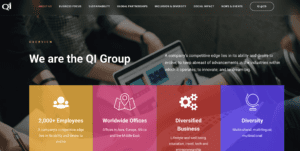Launching a new business venture seemed counterintuitive during the tumultuous 1998 Asian financial crisis.
Yet this challenging period marked the birth of QI Group, now a multinational powerhouse in wellness and lifestyle, luxury goods, education, hospitality, and sustainable community development in over 30 countries.
The QI Group operates across various sectors and is committed to innovation, sustainability, and social responsibility — more than 2,000 employees representing 50 nationalities power QI Group’s global operations today. The workforce maintains a near-even gender split — 53% male and 47% female — with women holding 44% of leadership positions. This diversity stems directly from the contrasting backgrounds of its founders.
Executive chairman Vijay Eswaran’s path to entrepreneurship began after he successfully revitalized a struggling Malaysian publishing company. However, he saw his position eliminated when new owners took control, which cemented his resolve to chart his own course.
Deputy chairman Joseph Bismark contributes a distinctive worldview shaped through early education in an ashram. His achievements include earning a 3rd Dan black belt in taekwondo and being part of the Philippine national team. His personal dedication to wellness — demonstrated through 40 years of yoga practice and vegetarianism — directly influences the company’s health-focused initiatives.
Both founders advocate leadership through service. “Leadership is not about telling people what to do,” Eswaran stated. “A true leader is one who knows how to serve.” This commitment to service requires cultivating specific leadership qualities, chief among them being patience.
Eswaran shared, “I value patience above all else. Patience is not just a virtue but a practice that requires daily application. It is a state of mind that emanates an inner sense of tranquillity, calmness, and serenity that permeates one’s surroundings. Such a leader becomes an oasis amidst the chaos.”
What Does QI Group Do?
The QI Group engages in strategic investments in wellness and lifestyle, education, travel and leisure, luxury goods, and retail. From its initial focus on direct selling and e-commerce, the company methodically broadened its scope through QI Capital, its investment arm. Today, the Group actively invests in various portfolio companies in the USA, the U.K., Malaysia, Sri Lanka, India, Hong Kong, and New Zealand. It has invested in financial services organizations, education, telecommunications, Swiss watchmaking, natural food retailers, hospitality management, and an online marketplace.
Quest International University is among the company’s flagship achievements. Located in the state of Perak, Malaysia, since 2011, QIU has welcomed roughly 15,000 students from 50 countries. The institution’s growth continues through innovative financing — a $21.48 million Sukuk Ijarah program with a leading Malaysian bank marks QI Group’s first venture into Malaysian capital markets.
The acquisition of Swiss watchmaker Cimier, celebrating its centennial in 2024, anchors QI Group’s luxury division, which also includes the Bernhard H. Mayer Collection of exclusive watches and jewelry.
Eswaran said, “We created specific designs, worked with specific movements, and drew inspiration from its heritage while designing for a new generation of watch connoisseurs.”
The company’s 2010 unveiling of the Watch Academy revolutionized customer interaction with luxury timepieces. Eswaran explained, “Here, customers can experience the art of watchmaking firsthand. We invite customers to our workshop to choose and build their own watch, which creates a bond quite unlike anything else in the industry.”
Meanwhile, QI Group’s hospitality portfolio features boutique hotels and resorts across Thailand, Malaysia, Sri Lanka, and Turkey. These properties consistently earn four-star-plus ratings on major travel platforms, emphasizing guest satisfaction through personalized service.
Among Thailand’s premier eco-friendly destinations, Prana Resort Nandana in Koh Samui is revolutionizing sustainable hospitality. This thoughtfully designed destination, part of the QI Group of Companies, has implemented comprehensive green initiatives throughout its operations. Its innovative approach includes eliminating single-use plastics, supporting local communities through sustainably sourced ingredients, and engaging staff in local environmental conservation efforts. Thai environmental authorities have recognized these pioneering efforts in sustainable tourism with the Green Hotel Standard (Gold).
“As travel and tourism picks up again, we must remember the lessons from the pandemic and never take Mother Nature for granted again. The sustainable future of hospitality businesses is likely smaller-scale, authentic, and experiential. Governments, businesses, and consumers must align their tourism practices with the UN’s Sustainable Development Goals and a 1.5 degree future,” said Eswaran.
Strategic Growth Pattern
The Hong Kong-registered company maintains its corporate headquarters there while operating a regional green-certified operational hub in Petaling Jaya, Malaysia. From these foundations, QI Group expanded methodically into South Asia. It also began operations in the Middle East, Europe, and Central Asia before venturing into the diverse markets of sub-Saharan Africa. Their business strategy prioritizes four core values: integrity, service, sustainability, and leadership.
This privately held organization continues expanding under the guidance of Eswaran, Bismark, and their board while maintaining its commitment to ethical business practices and social responsibility. Their success proves that commercial achievement need not compromise environmental stewardship or community impact.
“When we started the company, one common view among the partners was to make sure that we incorporated within it a way to pay back to the community — worldwide, as well as where we live, because we are very much a worldwide organization,” said Eswaran. This vision led to the creation of the RYTHM Foundation, named after Mahatma Gandhi’s values and universal principles.
Since 2005, the foundation has implemented over 200 projects across 20 countries, focusing mainly on children’s welfare and development. Through its employees’ dedication of 114,000 service hours and numerous targeted initiatives, RYTHM Foundation works to create sustainable positive change in communities worldwide, integrating social responsibility throughout its operations and helping provide resources for lasting improvement in people’s lives.
As businesses face mounting pressure to address global challenges from climate change to social inequality, QI Group’s quarter-century journey offers valuable lessons in sustainable enterprise. While many companies now scramble to retrofit operations with environmental, social, and governmental principles, QI Group’s integration of social responsibility and sustainability from its inception demonstrates the long-term advantages of a purpose-driven business model.
Its success challenges the notion that profitability and social impact must be traded off against each other. As emerging markets continue to evolve and new generations of consumers increasingly demand corporate accountability, organizations that follow QI Group’s blueprint of embedding social responsibility into their DNA rather than treating it as an afterthought may find themselves better positioned for the challenges ahead. The company’s ongoing evolution suggests that ethical business practices and innovative thinking can create resilient organizations capable of thriving through global uncertainty while contributing meaningfully to society.
Read more:
What Does QI Group of Companies Do? From Education to Sustainability Initiatives















